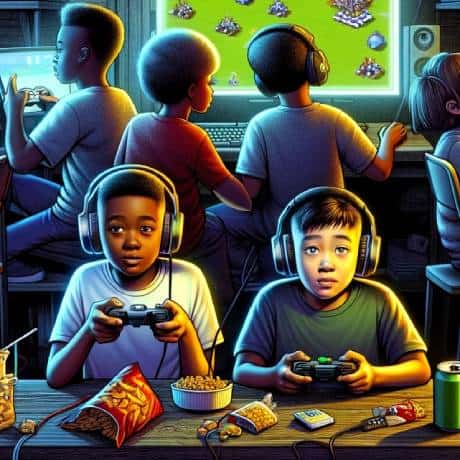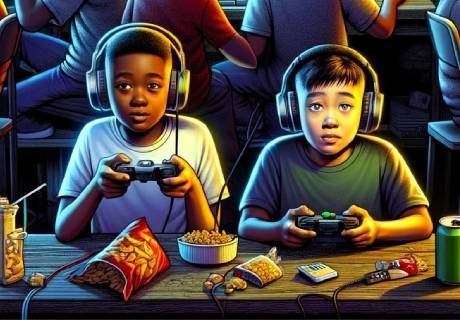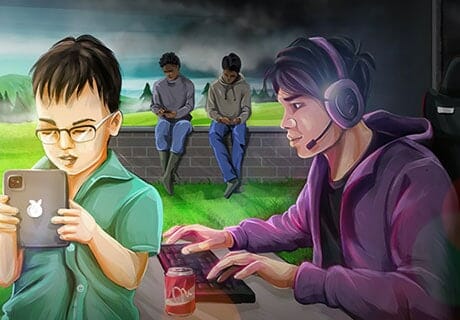Screen time refers to any activity that involves looking at a screen. It includes playing video games, watching shows, surfing the web, and many more activities on a mobile device, Tablet, TV, or Monitor. The list continues to grow, in addition to getting closer to one’s eyes. Almost everything is done via a screen for kids these days: homework, fun, and socializing with friends. But while computers and technology have greatly enhanced our lives, too much screen time can be harmful, especially for developing children.
Types Of Screen Time
According to the International Journal of Behavioral Nutrition and Physical Activity, there are four types of screen time:
- Passive
Passive consumption occurs when your child engages in screen activity without thinking. This can happen while watching a movie, flipping through the channels, browsing Youtube videos, or simply monitoring social media. No thought is necessary when they perform these things.
- Educational
While most screen time is not academic, some are. These include informative media that teach kids about history, science, and other subjects.
- Interactive
Interactive screen time requires thought and participation. A child must answer questions, solve puzzles, click on items, or interact with the device. Examples of interactive screen time include trivia shows, simple educational games on touch screens, console and video games, etc.
- Social
Social screen time requires your child to interact with other people in a social manner. This can include playing games with other players, interacting on Social Platforms, talking to relatives, and other social activities.
However, while screen time may benefit, excessive use can lead to detrimental side effects.
The Dangers Of Excessive Screen Time
Excessive screen time also encourages sedentary habits, which may lead to children becoming obese and forming other bad habits that can be difficult to break.
For example, when children constantly look at screens for entertainment, they don’t develop hobbies or interests outside of technology.
Monkey See, Monkey Do
So much emphasis is placed on limiting children’s screen time and making them healthier individuals. But unfortunately, some adults forget that children will follow what they see. They mirror our actions and behaviors, whether we like it or not. This is why parents must take their screen time seriously if they want their children to follow suit.
Gaming Disorder (Gameaholic)
The World Health Organization classifies gaming disorder as a pattern of gaming behavior (“digital-gaming” or “video-gaming”) characterized by impaired control over gaming, increasing priority given to gaming over other interests and daily activities, and continued or increased gaming despite the occurrence of negative consequences.
Kids engaging in screen time for gaming is usually not educational, and they focus on the short-term pleasure gained from these activities, which can lead to Game Addiction (Gameaholic).
How Does It Affect Children’s Development?
The American Academy of Pediatrics (AAP) reports that excessive screen time can harm children’s development in several ways. One way is by delaying their physical development, which can lead to obesity and vision problems.
- Physical development
Too much screen time can delay a child’s physical development. Studies from Iowa State University show that too much screen time causes kids to miss out on vital activities for their growth. But, of course, the main problem with screen time is that it can keep kids from getting their recommended amount of exercise. The AAP recommends that children get at least one hour of physical activity daily. Too much screen time makes them passive and keeps their bodies from developing correctly. Aside from that, too much screen time can cause many eye disorders and vision problems.
- Mental development
Whether or not your child engages in screen time affects their mental development. For example, as kids interact with virtual worlds, they don’t develop real-world interpersonal skills like empathy, communication, and critical thinking. As the AAP warns, children who spend too much time watching or playing video games fail to engage in critical thinking activities like reading books, solving puzzles, and building blocks. This leads to problems later in life: children who spend too much time looking at screens do not learn how to interact with others or think critically about the world around them.
- Psychological development
Some parents may find it challenging to determine the connections between screen time and children’s mental health. But unfortunately, it can hurt your child’s psyche in several ways. According to research on adolescents, this includes aggression, anxiety, depression, loneliness, inability to handle feelings, and lack of social skills. Society has placed a high priority on academic and athletic success for children. Unfortunately, too much screen time can destroy your child’s chances of success in these areas. Other problems include aggressive behavior, mood problems, and difficulty sleeping.
How Much Screen Time Should Kids’ Age Groups Have?
Healthy screen time is in moderation. Limit the time your child spends with screens and find other activities for them to enjoy doing, such as playing board games, something creative (ie. drawing), taking up a hobby, going for a walk, or other activities.
The time a person should be in front of the Screen depends on the following:
- Age of the person
- The type of Screen Time (Passive, Educational, Interactive, Social)
- The closeness of the Screen (Drive-in, Movie Cinema, TV set, Tablet, Mobile, VR Headset)
- Ability to have breaks during Screen Time
- Previous Screen Time on the same day
Suggested screen time for age groups:
As indicated above, times may vary depending on circumstances and screen type. The following are for mobile devices or Tablets.
- 0-18 months: Children under 18 months should be kept away from electronic gadgets unless they are used for video conferencing for short periods. So don’t use a Mobile Phone or Tablet (iPad) as a babysitter. Screens should not be the first thing they desire; make an effort to plan playdates for your children, read books, and engage in outside activities.
Screen Time: 0 Minutes
- 18-24 months: Toddlers between the ages of 18 and 24 months should have their parents’ presence. Supervising your child during screen time is vital and have them watching educational material. Plus, even though young, kids will find a way to change what you give them to watch if you are not there.
Screen Time: 30 Minutes Supervised
Screen Time (Weekends): 1 Hour Supervised
- 2 to 5 years: Children in this age group are typically capable of comprehending and engaging in device-based games. As a result, parental supervision of their child’s screen time becomes far more crucial.
Screen Time (Weekdays): 1 Hour Supervised
Screen Time (Weekends): 2 Hours Supervised
- 5 to 8 years: Reinforce healthy habits via a reward system like the “Vitality Challenge” for kids.
Screen Time (Weekdays): 1 Hour Supervised
Screen Time (Weekends): 2 Hours Supervised
- 9 to 18 years: Discuss with your child what they are watching and playing and reinforce healthy habits via a reward system like the “Vitality Challenge” for kids.
Screen Time: 1.5 Hour Monitored Time
Screen Time (Weekends): 2 Hours Monitored Time
Weekends (Extra Time)
Extra time may be given during weekends, yet try not to exceed the times allocated per age group in 1 sitting and have over an hour break between rewarded times.
If at all possible, only have 1 ScreenTime reward in a day on the weekend.
What is Screen Time Management?
Lionel Thomas from Vitality For Gamers developed the Screen Time Management System (View Here) while working in the Computer Games Industry and seeing how his nephew became fixated with mobile devices and video games at an early age.
This system is part of the Vitality Challenge, aimed at healthy habit creation and actions, find out more:
Other solutions would be to use Parental Control Apps & Software.
Parental Control Apps & Software for Screen Time
We are testing some of the Parental Control Apps & Software out there and will start adding reviews soon.
Final Thoughts
Too much screen time can negatively affect children’s physical and mental health. That’s why parents need to set screen time limits (based on device/screen type) and ensure their kids are getting a balance of activities on and off the screen.
There should be no screen time until a child has achieved an activity or multiple activities; check out our “Screen Time Management“.
Automated closing of Games & Programs is also not advised, even if it has a warning, as this may create anxiety and anger.
Parents need to be part of their children’s screen time management, and they also need to be good role models by managing their own screen time.









 Snacks
Snacks Water
Water Eye Sight
Eye Sight Hearing
Hearing























 Screen Time
Screen Time Play Sports
Play Sports
